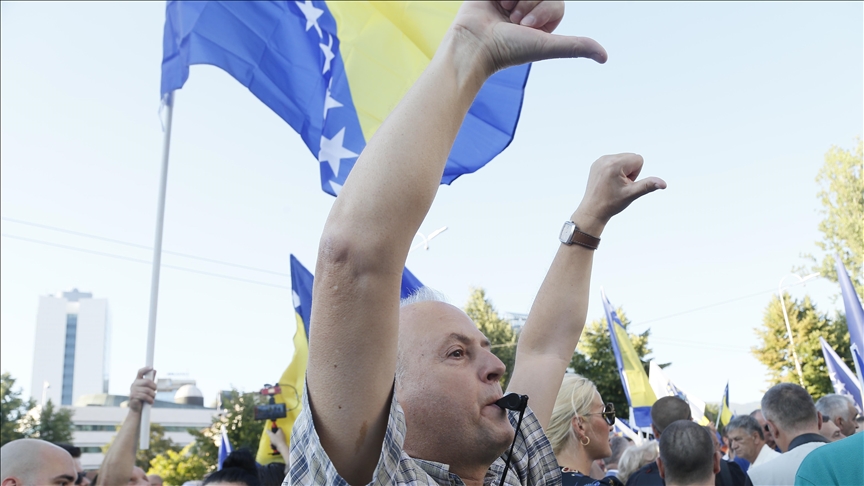
BELGRADE, Serbia
Thousands of people gathered in Bosnia and Herzegovina's capital Sarajevo on Monday to protest possible amendments to the nation’s election law and constitution by the Office of the High Representative (OHR), an international institution that is responsible for implementing the country’s peace agreement.
Several thousand people gathered in front of the OHR’s office to convey the message that solutions based on ethnic discrimination and which are contrary to all democratic and legal standards are completely unacceptable.
Dervo Sejdic, a Bosnian Roma who had in the past appealed to the European Court of Human Rights in Strasbourg, France after he was blocked from running in elections because he was not Bosniak, Croat or Serb, called for protests over the planned changes to the election law.
Many political parties joined the call, including the Social Democratic Party of Bosnia and Herzegovina (SDP), the Democratic Front (DF), the Democratic Action Movement (PDA), Our Party, the Democratic Action Party (SDA) and the People and Justice (NiP) party.
The protestors carried the national flag of Bosnia and Herzegovina. No incidents were recorded and the gathering was secured by a large number of police officers.
Earlier in the day, SDA leader Bakir Izetbegovic said Bosnia needs the authority of a high representative who would protect the constitution and the 1995 Dayton Peace Agreement.
Izetbegovic's remarks came at a press conference following an extraordinary meeting held at the SDA’s headquarters ahead of the protest in front of the OHR.
According to local media, by Aug. 1, Christian Schmidt, a German politician and the High Representative for Bosnia and Herzegovina, will impose measures for the re-functioning of Bosnia’s Federation (FBiH) entity.
"The high representative in Bosnia Herzegovina is to protect the Constitution and the Dayton Peace Agreement and by no means to impose solutions that we failed to reach through a series of negotiations that stretched throughout the last year, especially changes in the very sensitive sphere of inter-ethnic and party balances and the balance of party influence among the ethnocentric and civic parties,” said Izetbegovic.
Visiting Bosnia Herzegovina, Croatian Prime Minister Andrej Plenkovic said it is in Croatia's interest to have a stable and democratic Bosnia Herzegovina in which Croats will be equal.
"The key is inclusion, so isn't it most natural that Croats who voted and fought for the independence of Bosnia and Herzegovina will be able to participate in the government? These reactions are exaggerated. We need to calm down so that the elections can be conducted in the best way," said Plenkovic
Plenkovic's remarks came after meeting with Dragan Covic, the head of the Croatian Democratic Union (HDZ), the main Bosnian Croat party.
For his part, Covic said Bosniaks in the country want to maintain the status quo.
"During the last two years, we tried to implement the agreement in Mostar. We failed. The wish of the Bosniak parties was to maintain the status quo, but they only partially succeeded in that because all the problems surfaced when it came to the majority of the minority people. I am convinced from the talks with the high representative that those decisions will go in the direction of a democratic atmosphere in the campaign phase as well as that immediately after the election, the results will be able to be implemented," he said.
According to local media, Schmidt, who oversees the peace agreement’s implementation in Bosnia Herzegovina and has special powers to impose laws and dismiss officials, would impose a new law regarding how delegates are chosen from the House of Peoples of the Bosniak-Croat Federation entity’s parliament.
Many say the OHR would give the Croat nationalist party HDZ and the Alliance of Independent Social Democrats (SNSD) party a disproportionate degree of political influence and further deepen discriminatory ethnic divisions.
Bosniaks, Croats and Serbs will lose representatives in the House of Peoples if their ethnic population in any federation canton amounts to less than 3% of the same ethnic population in the federation entity.
This would allow HDZ to get more delegates, at least 14 out of 17 seats in the Croat group, as HDZ rules in cantons with larger Croat populations.
With complete control over the Croat groups, a member from the HDZ will now be guaranteed a seat as either the president or as one of the two vice presidents of the federation in a team with a Bosniak and a Serb selected from their respective groups.
Regardless of whether the HDZ has a president or a vice president for the federation, all three ethnic constituencies are required to form the government, making the HDZ indispensable.
Under the current election law, at least one Bosniak, one Croat and one Serb delegate are elected from each canton.
This would be the third time Schmidt uses the so-called “Bonn powers” after assuming office in August 2021.
The first time he did so to annul a law on immovable property in Republika Srpska, a Serb-dominated entity.
The second time, Schmidt used his "Bonn powers" to finance the country’s general elections on Oct. 2, allocating €6.5 million (approximately $6.97 million) for the Central Election Commission.
Anadolu Agency website contains only a portion of the news stories offered to subscribers in the AA News Broadcasting System (HAS), and in summarized form. Please contact us for subscription options.Source https://www.globalcourant.com/thousands-in-bosnia-protest-possible-changes-to-election-law/?feed_id=2215&_unique_id=62df861b56c53

إرسال تعليق